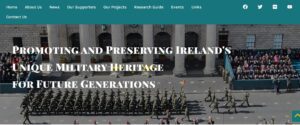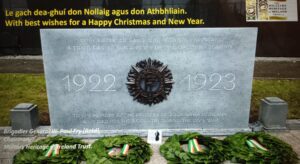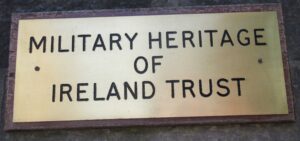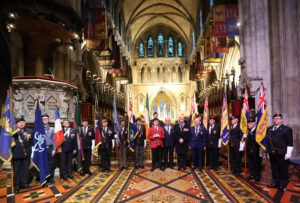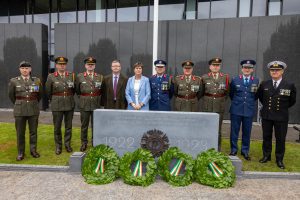Under the auspices of the Parnell Society, this year’s International Summer School took place from 10th to 14th August 2014, at Avondale Demesne, Rathdrum, County Wicklow, which is the ancestral home of Charles Stewart Parnell.
An educational trust, the Parnell Society was established in 1986. The aims of the Society include stimulating interest in the life, work and times of Charles Stewart Parnell and the Parnell Family, and exploring the relevance of Parnell and the politics of his era to modern Ireland.

Over the years, the themes of the Summer School included the Famine, Emigration, the Irish Parliamentary Tradition, the Republic, Religion in Irish Society, the Ulster Question, and Leadership.
Marking the centenary of the outbreak of the First World War, the theme of the 2014 Summer School was “War & Peace”. The organisers’ intent was to “go beyond a concentration on the First World War, and to consider broader issues of war and peace in the twenty-first century”.
In addition to members of the Parnell Society and Parnellites, attendees included academics, writers, historians, politicians, journalists and members of the public.
The 2014 Summer School was formally launched by Major-General David O’Morchoe CB CBE, President of the Royal British Legion and a Director of the Military Heritage of Ireland Trust. The Trust was represented at the opening by its Chairman Brigadier-General Paul Pakenham.
During the course of his address, Major-General O’Morchoe stated, inter alia,
“It was well known that those who had returned to Ireland after the First World War, came to a difficult and unwelcoming Ireland and that the then political atmosphere was for many years one of disapproval of those who had taken part in it, to the degree that they had been swept into oblivion and that official remembrance of those who did not survive was ignored.”
“From a background of 80 or so years of no acknowledgement or remembrance, the cease fires leading up to and including the signing of Good Friday Agreement in 1998, when significant reconciliation efforts had been encouraged by the Governments involved, led to the development of a greater and significant understanding. A positive attitude has spread across the island which encouraged the remembrance of the dead of the First World War.”
When the Summer School opened on Sunday, the keynote address was delivered by Professor Brendan Simms, Professor of the History of International Relations at the University of Cambridge. His address centred on “The German Question and the European Problem.”
During the course of the Summer School, papers were delivered by leading scholars from Ireland, Britain, Australia and the United States of America.
On Monday, speakers included Heather Jones, Associate Professor of International History at the London School of Economics who spoke on “Violent Transgression and the First World War. Dagmar O’Riain Readel, Department of History, University College Cork spoke on “The Peace before the War”, a lecture commemorating the 100th Anniversary of the Battle of Clontarf. The afternoon featured a panel discussion centred on “Your country needs you – Patriotism in the 21st century”. The panel included the Minister for Transport, Mr Paschal Donohoe TD and the Attorney-General of Northern Ireland Mr John Larkin QC.
Tuesday’s first lecture titled “The Chief and the Chairman – Parnell and Redmond Compared”, delivered by Dr Conor Mulvagh, Lecturer in Irish History at University College Dublin, was chaired by Mr John Bruton former Taoiseach. Tuesday’s other lectures were presented by Christopher Power, Independent Scholar, and by the Hon Hugh O’Flaherty former judge of the Supreme Court whose subject was “Monsignor Hugh O’Flaherty”, who was his uncle and saved the lives of over 6,500 persons from Rome during the Second World War.
Speakers on Wednesday included Tom Bartlett, Professor of Irish History at the University of Aberdeen “The Irish At War – from earliest times to the 20th century”, Ian d’Alton of the University of Cambridge and John Horne, Professor of Modern European History, Trinity College who spoke on “Ireland and the Great War”.
Lectures on the final day were delivered by Angela Griffith of Trinity College Dublin, Jeff Kildea of University of South Wales “Henry Clarke and the First World War Memorial Books”, L. Perry Curtis, Jr of Brown University, Rhode Island, and Irish Times journalist Peter Murtagh.
Since its foundation, the Parnell Society maintains the memory and political legacy of the Parnell family through a number of activities including the annual Parnell Summer School and Spring Day lectures
The Society has been directly responsible for the events such as: Memorial tree planting at Avondale Co Wicklow, unveiling of a commemorative plaque at the former Steyning Registry Office (near Brighton) where Charles Stewart and Katharine Parnell were married, erection of a memorial stone from Avondale Co Wicklow over the grave of the patriot Fanny Parnell in Mount Auburn Cemetery, Boston, U.S.A, commissioning of a commemorative white rose known as the ‘Katharine Parnell Rose’, and presentation of the official press transcripts of the Parnell funeral to Dublin City Archives.
The Parnell Society can be contacted through its web site:
